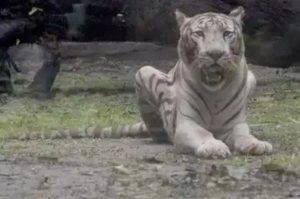Captivity Taking a Toll: A recent study has revealed a concerning trend at Kolkata’s iconic Alipore Zoological Garden. Animals in captivity are increasingly being diagnosed with severe health issues, including lameness, hepato-renal complications, and respiratory illnesses, raising serious concerns about the long-term effects of confinement on wildlife.
The findings, part of a broader survey examining animal health at Indian zoos, underscore the need for urgent welfare reforms and scientific monitoring. With Alipore Zoo being one of India’s oldest and most visited zoological parks, the situation reflects systemic problems in zoo management and captive wildlife care across the country.

Key Findings: Common Ailments in Captivity
Veterinarians and researchers have identified multiple health complications among zoo animals, including:
- Lameness caused by restricted mobility and hard flooring.
- Liver and kidney issues, often linked to stress and poor diet.
- Respiratory problems, particularly among carnivores and primates.
These findings align with earlier necropsy-based studies across Indian zoos, which noted that nearly 50% of captive animal deaths were trauma-related. Other causes included tuberculosis, pneumonia, hepatitis, and septicemia.
The Alipore Zoo study indicates that these diseases are not isolated incidents but rather chronic conditions developed due to long-term captivity, inadequate enrichment, and limited access to natural behaviours.
Environmental and Seasonal Stressors
Environmental factors within the zoo have been shown to amplify health issues:
- Humidity and stagnant water during monsoon months increase parasitic infection rates.
- Poor enclosure ventilation contributes to respiratory illnesses.
- Monotonous surroundings and unnatural living conditions lead to psychological stress, which in turn weakens immunity.
Recent studies have also documented higher parasite prevalence among mammals and birds during the monsoon, especially in zoos located in eastern and southern India.


Behavioural Distress and Mental Health
Many captive animals at Alipore Zoo have displayed signs of psychological distress. Repetitive movements like pacing, head bobbing, and swaying—known as stereotypic behaviour—are commonly observed in big cats, elephants, and some primates.
Experts suggest that these behaviours are the result of:
- Lack of stimulation and environmental enrichment.
- Isolation or forced cohabitation with incompatible species.
- High noise levels and visitor crowding, especially near enclosures.
This mental distress not only affects behaviour but also exacerbates physical ailments by triggering hormonal imbalances and reducing appetite and immune response.
Infrastructure and Management Gaps
The study further highlights the following issues in zoo infrastructure and administration:
- Inadequate enclosure space and poor flooring contribute to musculoskeletal disorders.
- Limited access to species-specific diets, particularly for carnivores, affects digestion and organ function.
- Shortage of trained wildlife veterinarians, especially those specializing in exotic species.
- Lack of regular preventive screenings, such as blood tests or imaging, which could detect disease early.
While the zoo maintains a routine feeding and cleaning schedule, there is little evidence of comprehensive preventive healthcare or behavioural monitoring.
Steps Taken by Alipore Zoo
To its credit, Alipore Zoo has initiated several reforms in recent years:
- Introduced routine health check-ups and deworming schedules.
- Begun research collaborations focusing on animal behaviour and nutrition.
- Expanded outdoor enclosures for large mammals like giraffes and elephants.
- Enhanced visitor awareness programs on wildlife welfare.
Despite these efforts, experts stress that the zoo still lacks the comprehensive care protocols required to mitigate chronic illness and psychological stress in captive animals.
Captivity Taking a Toll: Call for Reform
The recurring pattern of illness and distress makes it clear that traditional models of captivity need a serious overhaul. Wildlife conservationists and veterinary experts are calling for:
- Enclosure redesign based on species-specific behavioural needs.
- Prey simulation and natural diet planning for carnivores and omnivores.
- Use of soft substrates to reduce lameness and joint pain.
- Regular mental stimulation, such as toys, puzzles, and habitat variation.
- Ethical visitor control measures, such as noise barriers and viewing limits.
- Mandatory presence of trained wildlife vets and animal psychologists.
These measures, if implemented across Indian zoos, could drastically improve the quality of life for animals in captivity and align with global standards for ethical wildlife care.
Looking Forward
The Alipore Zoological Garden, like many others in India, is at a crossroads. It must now choose between continuing outdated models of confinement or embracing a welfare-centric, conservation-driven future. The findings of this study act as both a warning and an opportunity—a chance to redesign captivity in a way that respects the biology, behaviour, and dignity of the wild.
External References for Further Reading
- Alipore Zoo Official Website – Research Wing
- Down To Earth Report on Zoo Animal Welfare
- Study on Necropsy Reports from Indian Zoos (Springer)
- ResearchGate – Surgical Interventions in Captive Animals at Alipore Zoo
- Wikipedia – Zoological Garden, Alipore
Also read: Home | Channel 6 Network – Latest News, Breaking Updates: Politics, Business, Tech & More

